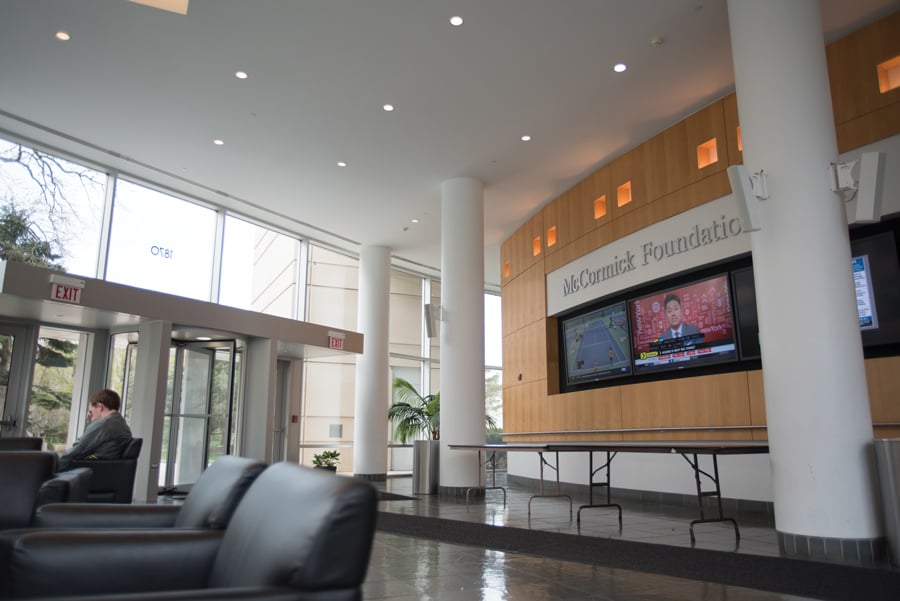Former NYT reporter Justin Gillis gives talk on climate change
Daily file photo by Colin Boyle
Former New York Times environmental reporter Justin Gillis spoke to Medill faculty and students in the McCormick Foundation Center Wednesday.
March 5, 2020
Justin Gillis, a former New York Times environmental reporter and author of the award-winning Times series Temperature Rising, discussed factors that contribute to climate inaction Wednesday in the McCormick Foundation Center.
In his talk, “Environmental Collapse: What Now?” Gillis advocated for a coalition of reporters and scientists to better communicate the urgency of ecological issues to the general public.
Gillis addressed several recent natural disasters and the extent of the current environmental crisis. He discussed the wildfires in Australia and California, the melting of the Arctic and floods, all of which are factors that have influenced public perception about climate change.
Rising sea levels, in particular, signify an impending refugee crisis as vulnerable coastal communities will be forced to relocate, Gillis said. Global institutions, he said, are unprepared for this.
“I don’t particularly like this term ‘collapse,’ but you can start to see how many collapses might happen,” Gillis said.
Despite these visible indicators of climate change and ecological disruptions, Gillis said there remains a large disconnect between the available science and the general public. Only one-fifth of Americans are aware that over 90 percent of climate scientists have concluded that climate change is real and a result of human action, he said. Journalists are failing to convey this scientific consensus and bridge this disconnect, he added.
Gillis said the fossil fuel industry knows that journalists attempt to be objective and present both sides of the story, so the industry creates a false narrative debunking climate change. By giving equal weight to both arguments, journalists obscure the scientific consensus that confirms climate change, he said.
The inability of scientists to communicate effectively with the general public is another factor Gillis said should be considered. Aleia Bellcross, a doctorate student studying atmospheric chemistry, worries about the disconnect and distrust between scientists and the general population.
“Academia, especially in the sciences, is kind of this ivory tower that is super inaccessible to the general public, especially the lesser-educated public,” Bellcross said.
To rectify these issues, Gillis suggested a campus coalition of climate scientists, journalists and social scientists. He said these alliances will help students better understand how to best communicate climate change and its urgency to a reluctant public. There need to be more people in the room, contributing to the conversation of environmental issues, he said.
One of the main focuses of Gillis’s talk was on the University’s role in the climate crisis.
“The failure to tackle the climate crisis is the most visible example of humanity’s failures of ecological stewardship,” read a summary of the talk distributed to Medill students. “As the situation seems to grow worse by the year, how can a university like Northwestern respond?”
Gillis’s talk comes two weeks after the Northwestern Board of Trustees rejected Fossil Free’s divestment proposal to divest the University’s holdings from any of the top 100 coal and oil and gas companies around the world. Divestment strategies aim to decrease the political power of fossil fuel companies and have been successful in increasing fossil fuel stock prices and costs of capital.
Sympathizing with student activists, Gillis urged members of the NU community to continue to hold the University to higher energy consumption standards.
“Don’t let the frustration completely paralyze you, look for other ways to move forward,” Gillis said.
Email: [email protected]












